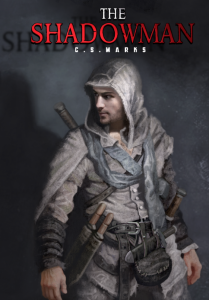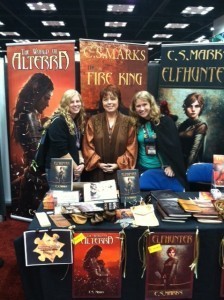C.S. Marks's Blog
August 19, 2015
Welcome to CSMarks.com and (temporarily) ELFHUNTER.NET!
Since ELFHUNTER.NET is currently undergoing extensive renovation (as well as a change of web host), we have directed you here. We will advise you of our progress as it happens…hang in there! If you have sighted the infamous Elfmobile, you can receive a free book! Just go to our Facebook page, using the following link, and tell us where and when you sighted it! We’ll send you a free e-copy of Elfhunter.
Link to FB (please “like” us while you’re visiting): https://www.facebook.com/Alterra.CSMarks
Welcome to the World of Alterra and C.S. Marks–taking aim at eager readers everywhere!
June 27, 2015
Lifetimes to build–moments to ruin.
I love trees. I have always been a forest-dweller, reveling in the sounds, scents, and sights of the deep woods. I love moss, and water, and the lilt of wood thrushes at twilight. When I need comfort, I go to the forest. When I feel adventurous, I go to the forest. When I want to get in touch with spiritual matters, I go to the forest. I love to sit and play my cedar flute and hear it echo among the trees and ravines.
I have lived in the State Forest for fifteen years; we moved here because I have access to the horse trails and such. I am accustomed to the idea that it is being “managed” for lumber (as an ecologist I have had the Forestry propaganda and other party-line gibberish thrown in my face for many decades now), but this has been brought painfully to my doorstep in the past weeks. They are logging the horse trails. Again.
Where there were beautiful little beech trees (considered “trash” by foresters, who basically have no regard for biodiversity) there are now stubs. Where there was a shady, winding hillside trail there is now a caterpillar-tractored muddy morass. Where there was once a lovely little rill of water crossing the trail—an excellent water-stop for the horses—there’s now a mud-filled ditch. I was angry, and my horse not a little nervous (what had happened to her familiar trail?). Then I reached the top of the hill and there, off to my right, was one of my favorite landmarks—a beautiful sassafras with a young beech tree twining gently around it as though in tentative, loving embrace. It was unusual to say the least…this symbol of tolerance and acceptance and whatever-else-you-wanted-to-read-into-it.
The loggers had gone out of their way to destroy it. It wasn’t in the path; they had merely bulldozed it over (having left the main track to do it) and gone on their way. I couldn’t help it—I cried like a child when I saw it. It broke my heart.
I won’t dwell here on the absurdity of trying to turn this part of Indiana into oak-hickory forest from the (rather obviously) more predominant beech-maple. The fact that so many little beech trees have to be destroyed kind of makes that clear. In fact, there’s actually another point to this post—I drew a parallel between the forest and the complex structure of one’s personal reputation. It takes a lifetime to build, and moments to ruin.
Reputation is arguably the most valuable asset we have. It’s the words we are known by—honest, classy, forthright, generous, capable, brilliant—and it takes a very long time to cultivate. Building a reputation means we have made the choice, time and again, to take time and care with our work, or to speak uncomfortable truth, or to remain silent when remaining silent is especially hard to do. We’ve made tough choices, gone out of our way to “do the right thing,” sacrificed our time, effort, and resources, and so on. The sort of adjectives most of us would prefer to be described with do not come easily.
Just like the forest, reputation is complex, multi-layered, and beautiful. It took a lot of time and energy to get that way, yet it exists in delicate balance. It can recover from small insults. One man with an axe can mar it, but will have difficulty destroying it. A timber company, on the other hand—especially one who cares for nothing other than profit—can ruin it in just a few weeks. That timber company can make sure that forest is, for all practical purposes, never the same again. The delicate structure of one’s personal reputation is just as vulnerable, now more than ever.
These days we have an army of loggers who stand ready to turn the delicate, complex entity of personal reputation into a pile of poorly-made pallets. The name of this army of loggers: The Internet. Their weapons: blogs, discussion forums, and social media. And some individuals, it seems, delight in the process, just as the loggers seemed to delight in the destruction of our pretty little embracing trees. These folks will go after anyone who disagrees with them or vexes them in any way.
Sometimes there’s an economic reason for it—simple attempt to discredit a competitor. I’ve seen that happen many times with book writers, an arena with which I am familiar. Very often, when an author’s work or reputation is attacked, the attacker proves to be a competing author. I won’t discuss the absurdity of the notion of “competing authors” here, though that might be a good topic for a future post.
At least the timber company has to own up to its depredation. If the loggers accidentally cut down trees on private land without paying for them, for example, they will be held accountable. But the internet is largely anonymous, and one person with an axe to grind may summon a hundred sock-puppets (accounts started by the same person) to increase the damage done and make it appear legitimate. It’s getting to be like the wild, wild West out here.
In such an environment, why would anyone risk the army of masked, anonymous loggers chopping at his carefully-cultivated reputation by doing something as ill-advised as bitching about a bad review? Why would one choose to take the easy path and purchase reviews, engage in reviewing circles, or speak negatively about his competitors? Why give in to the temptation to rant and whine in public? Why not stay classy? If you make a minor slip-up, you might get one man with an axe. But if you stray grievously, the loggers will pounce and you’ll be left with a pile of pallet-wood. And the forest might not re-grow in your lifetime.
Here are some hints for making your reputation logger-resistant:
DON’T POST ANYTHING on the internet in the heat of the moment. Walk away, think it over, come back and read it again before you hit “send.” When cooler heads prevail, you’ll banish the offending posts to your drafts folder.
Learn from those who have gone before. Google “author meltdown” if you want examples of how to put the logger-army on speed-dial. Total, clear-cut devastation in a matter of days—guaranteed!
Realize that, as valuable as it may be to you, your opinion is not required for the earth to keep spinning on its axis. It’s ok (and a good idea) to keep it to yourself sometimes.
I cannot protect the forest, as I do not own it and have no power to decide its fate. Regrettably, I have little faith in our political system. But I can use whatever power I have to protect my reputation. It has taken a lifetime to build, and I don’t want the bulldozers going out of their way to destroy every bit of beauty I have cultivated.
–CSM
PS: Stay the heck out of my drafts folder.
March 28, 2015
On Writing Violence
When people ask what other authors have influenced my writing, the answer surprises some of them. Everyone expects me to name Tolkien, and, of course, I always do. They don’t expect me to name “Stephen King.” I confess—I love King’s books, especially the real door-stoppers like The Stand and The Talisman. I read everything the man puts out; I even pre-order. I am willing to pay a top-of-the-scale price for one of his kindle books. The man can tell a story. Not only does his writing keep me engaged for a thousand pages (The Stand), but I will read it over and over again.
Many of Mr. King’s works are undeniably violent. He loves to throw in all sorts of disgusting things to push our buttons—be they cockroaches, maggots, worms, or whatever. Nobody is simply “found dead.” We live through every agonizing detail of the character’s skin-peeling, bone-crushing, artery-spouting demise, as well as the complete and utter degradation of his moldering corpse. And, like many readers, I tune in with morbid fascination fully engaged.
Yet my own writing is surprisingly lacking in graphic, descriptive violence. I don’t provide too many gruesome details, relying instead on the reader’s no-doubt-active imagination. Part of the reason is that I write crossover books intended for young readers as well as adults, but I really think it’s a chicken-and-egg question. I set out to write a book on an adult level, and it turned out to be a crossover.
There is a lot of violence in Alterra. Gorgon Elfhunter does unspeakable things to the Elves—he tortures them and makes them suffer mightily before killing them—and those details would be very graphic if I chose to give them. Some description is necessary for the readers to understand what’s going on, but they are nothing a ten-year-old can’t handle. (For the record, I am amazed at the level of violence today’s ten-year-olds can handle.)
I should imagine this lack of descriptive, graphic violence annoys some readers. Fantasy today seems to be turning in an ever-darker and ever-more-grisly direction. If you enjoy the violent machinations of, say, George R.R. Martin, you might be disappointed in Alterra…or you might not. Sometimes readers need a break. Sometimes, regardless of age, we appreciate the ability to “turn away.”
I have noticed a few things when observing crowds of people witnessing the aftermath of violence. Some people clamor to get a front row seat—they want to view the disaster in every detail. They are the ones standing in the front of the crowd, looking up at the despondent fellow on the fourth floor ledge, perhaps hoping the fellow won’t actually jump but knowing that, if he does, they will be right there to see it. They are the ones who slow way down when driving past a horrific accident on the freeway, craning their necks for a better view. This is a natural human inclination, and I am not passing judgment of it.
Other people would rather not witness the violence pervading everyday life. They would rather not see the mangled victim; they would rather not read about the mother who strangled her children and shoved them in trash bags (photo on page six). They would rather turn away. I think it’s the same with readers. The reason many people enjoy the “Alterran approach” to violence is that it gives them the chance to turn away.
There are several advantages to this type of writing. One is that readers have the opportunity to engage their imaginations to whatever extent they desire. Trust me…some of them can imagine far more horrific things than I could ever describe. They can choose to view the violence, or they can choose to turn away. Therefore, I can sell the books to ten-year-olds.
I have found that, as a reader, both strategies are effective. I can savor the dripping corpses of King’s violent works, but I am no less affected by the gentle tragedy of some of his less graphic offerings, such as the novella The Body, on which the film Stand By Me is based. Sometimes, in fact, too much violence desensitizes me, and I am left with only morbid curiosity. That was the case with the Game of Thrones books. After awhile I just didn’t care.
I don’t want to desensitize readers in Alterra. I want to give them the choice of how deep into the bloody scene they want to sink. I want to give them the option of turning away. I want every character’s suffering to affect them; otherwise it loses meaning and impact.
I intend to keep to my course. Violence will always be a part of every world, even in fantasy, and just the right amount of description can evoke all the right emotions in my readers. But I will continue to leave them that choice—to plunge headlong into the bloody banquet, or to turn from it at the door. It’s worked for me so far. Besides, I want to continue selling books to ten-year-olds.
–CSM
April 20, 2014
Update on The Shadow-man…
 Start looking for it, folks! Went through final pre-flight check tonight. (I’m so excited! I hope you enjoy it.) –CSM
Start looking for it, folks! Went through final pre-flight check tonight. (I’m so excited! I hope you enjoy it.) –CSM
March 4, 2014
Shadow-man…Done and Dusted!
SO, after a long night of crafting the final scene of my newest novella, The Shadow-man is done and dusted. At this point I would say it’s a polished draft. It still needs beta reading, editing and revision, but that hard part is over. Next stop–cover reveal! 
This one was more difficult to write than the first two, as I had to step out of my comfort zone. The structure of the story really hinges on a man’s inner journey, and not an over-arching “historical” event. It’s written, shall I say, a bit differently than the others, too.
The cover is, as usual, fantastic. I can hardly wait to share!
–CSM
January 29, 2014
Books as “Babies”–an Opinion
There’s been a bit of kerfuffle on the Amazon forums recently. (I know…what a surprise, right?) On the one side, we have authors who like to refer to their books as their “babies.” On the other, readers and reviewers who believe such comparisons are ridiculous and unwarranted. They view the authors’ tendency to talk about their “babies” as an attempt by the authors to ward off criticism of their work. Tempers have flared a bit (yes, I know, another surprise) and some pretty harsh words have flown from both sides.
Anyone who knows me realizes that I’m not a fan of authors who do not take criticism with grace, who engage in deceptive practices, or who carry out vendettas against reviewers. Nor am I fond of those readers who decide to carry out vendettas against authors. Raw feelings have been laid bare, accusations–both well-founded and unfounded–have flown, and threats have been made on both sides of the line. As usual, I lurk but rarely post. However, this is an issue in which I can truly see both sides of the argument. Y’see, I have compared my books with babies, too.
There are some things in common between the gestation of a novel and that of a child–with some very important differences. The novel takes longer, at least mine do. During that gestation period, a great deal of my time goes into the synthesis, development, and maturation of my “baby.” Like a baby, I carry it with me everywhere, and think about it constantly. Along with that time we have resources–thought, imagination, creativity–I have a great deal of “sweat equity” and personal investment by the time the book is ready to be “born.” When I finally finish it, I am most likely drained physically, intellectually, and emotionally. Then there’s a sort of postpartum depression that goes with finally declaring the novel finished–a work I’ve been focusing on for the past year. There’s a sort of “Ok, NOW what?” feeling, at least for me.
Then comes the polishing. That is likely to take at least six months, if not longer. I wait for the editor to pick the book apart, I revise, revise, and revise some more. I “feed” my book the best editing and revisions I possibly can, getting it ready for the wide world. I dress it up with first-class cover art. Now it’s ready to be presented–ready for that all-important debut. But here’s the thing…it’s not a baby any more. When it goes to market, it had better be a full-grown, ready-for-anything adult.
Yes, I sometimes view my books as I would view children. They are my product, my legacy. There’s a lot of “me” in them–my world view, my original characters, no doubt some wish-fulfillment. If they fail, I am devastated. If they succeed, I am elated. But I do NOT expect anyone else to see them that way. Readers aren’t expected to care one bit about my sweat equity or emotional investment. The books are there for them to judge however they please. If I didn’t want my “children” to suffer the slings and arrows of the wide world, then I should have kept them at home.
I never refer to them as “my babies” to anyone outside my inner circle. In fact, I believe my books would be quite annoyed to be referred to as “babies”. I can hear them now:
“Babies? BABIES? We have well-developed characters, a plot interwoven with many mature themes, and professional production value, thank you very much! Calling us babies implies that we are immature, not-ready-for-prime-time releases. I mean, really! We’ll respectfully request that you call us “the books” from now on, if you please.”
So, though I might see commonalities between gestation and novel-writing, I’ll keep them to myself or call them something else. More to the point, I won’t expect anyone else to ever view my works as anything other than what they are. I’ll keep writing and striving to send worthy works out into the world to be loved (or not) by readers. That’s the only real “parenting” I can do.
January 17, 2014
How to Write a Customer Review–You can do it!
If you have purchased a book, you’re a customer. That means you have all the qualifications necessary to write and post a customer review on Amazon, Goodreads, or anywhere you wish. So, what’s stopping you? Many readers say that they are unsure of how to write a customer review. They’re afraid it won’t be “good enough” or that they don’t write “well enough.”
Have no fear. You’re a customer, you have every right to leave that review, and you CAN write a good one! The purpose of this post is to share some insights and opinions (mine, of course) regarding reviews. I’d like to encourage my readers to leave their thoughts for the benefit of other readers. An honest review helps everybody.
What matters in a customer review?
–Honesty above all.
In fact, I might suggest it’s the only thing that matters.
If you’re wondering what to say, just imagine that a friend has asked you whether he/she should read the book. What would you tell your friend? What did you like about the book? What did you not like about the book? Can you recommend it, or would you pass it by? You want to help your friend choose wisely. If you couldn’t finish the book, say so. If it was too violent, say so. If it was absolutely captivating, tell your friend why. There are no wrong answers here.
What doesn’t matter in a customer review?
–Impeccable mechanics. You’re a customer, not a writer. We, the potential purchasers, are reading your review to gain insight–not to criticize your writing ability. Have no fear.
–Biting wit and satirical brilliance. While these may add entertainment value to your review, they are absolutely not required and might, in fact, distract us from whatever guidance you’re trying to give.
–Length. Helpful reviews might be lengthy, or very brief. The point is that they helped me make a sound purchasing decision. Some reviews, in my opinion, are a bit too lengthy–they take up two columns of text on Amazon and I find myself skimming through the extensive plot summary. I dislike plot summaries in general unless they are very minimal. In my opinion, they are not necessary in a customer review. I want to know what the customer thought of the book.
Here’s an example of a brief, but potentially helpful, review. “I enjoyed this book. I liked the story and the characters–it was an exciting and emotionally draining read. However, I could have done without the graphic sex scene tossed into the middle of chapter twelve. If that doesn’t bother you, you’ll probably like the book.” ***3 stars.
(Now, see, I might buy this one just to read chapter twelve and see what the big deal is…ha!)
You are sharing your opinion with other customers. You have no duty to the author whatsoever. In fact, we appreciate the fact that you took valuable time to sit down and write a review of our work. Even if you hated it, we appreciate your sharing with others. We want readers to find our books–readers who are likely to love them. Critical reviews help with that. Example: “I hated this book. It has frogs in it and I hate frogs.” First of all, if I also hate frogs, I’ll appreciate the heads-up. Second, as the author I would rather warn people who hate frogs to choose another book, as they are unlikely to be happy with mine. And those who love frogs will purchase it–they are the readers I’m hoping to reach. There are no wrong answers.
A few things we should avoid:
–Spoilers. Probably not a good idea to tell us who the murderer is or that the dog dies (although I would appreciate that one, as I won’t buy the book if the dog dies).
–Superlatives. Statements such as “This book should be thrown into a pit of flaming lava,” or “This is the best book ever written,” are perhaps less than helpful. You might believe it, but we might not take it seriously.
–Personal attacks. We might disagree with the author, but it’s best if we confine our criticism to the work and not extend it to the author personally. (I recall one reviewer who, having expressed his dislike of my strong heroines, questioned the fact that I could have ever been married, as stated in my bio.)
So, to summarize, tell us what you think of the work. Tell us as you would a friend asking for a recommendation. Don’t fuss, don’t give away too much of the story, and don’t get personal. You’re a customer–you’re qualified!
Until next time,
–CSM
December 10, 2013
Putting Things in Perspective: Readers as Individuals
Putting Things in Perspective–Looking at Readers as Individuals and not as Numbers
In late 2005, I published my first novel. To tell you the truth, I didn’t expect much. I just wanted to share the story with as many readers as I could manage, hoping to entertain them, stimulate their imaginations, make them happy…
This was in the days B.K. (Before Kindle). I went to bookstores and conventions with my twenty-dollar paperbacks, trying to convince readers to invest. The paperbacks were available on Amazon, too, and they sold better than I had expected. People would recommend them on Amazon discussion forums, and I saw them on quite a few lists on sites like Goodreads. Every once in a while we’d get reports (which I called “random fandom sightings”) of Elfhunter cropping up in a Barnes and Noble somewhere like Coronado, California or Austin, Texas. I was slowly–very slowly–building a readership.
Every reader who received a book (often directly from my hands) was a treasure. Often that decision to buy was hard-won. It would only happen after quite a lot of page-riffling, chin-stroking contemplation, especially from parents whose wide-eyed young reader-children stood ready to leap into Alterra with both feet. I pitched the book, answered questions, handed them a “read-me” copy with the suggestion that they cosy up in a comfy chair and try it on for size. If we got that far into the relationship, they usually bought one, but I could often see the debate going on. (Should I try it? Will I like it? Will my son/daughter like it? Will I get my money’s worth?) Then, if the stars were right, “OK, I’ll give it a try.”
Signings were great, especially as additional books in the series came out. I would start seeing real fans of Alterra showing up at the mall just to see me and grab my latest. There’s a kind of euphoria that comes with knowing that one has actually succeeded in drawing readers so thoroughly into one’s imaginary world. That euphoria is beyond description. (Wow! I entertained, I stimulated, I made them happy…)
Then came the Kindle, and everything changed.
It’s now 5 years P.K. (Post-Kindle), as I sold my first e-book in 2009. The bookstores, except for a few independents and the few remaining B&N stores, are gone. GONE. And there are now a million-gajillion “indie” authors uploading their books every second of every minute of every day. There is little hope of visibility amid such a quantity. Publishing has become ridiculously easy, and marketing has become absurdly difficult. Writing? really? Who’s got the time for that? We have to be pounding the blogosphere and running promotions and working social media. That is, if we want to be “successful.”
A few self-published authors have risen to meteoric fame and fortune. There’s also a short list of those who have acquired traditional publishing contracts, which is what I would really like to acquire for Alterra (I’m still stuck on the idea that the validation of a traditional publisher is necessary in order to be a “Real Boy,” Pinocchio). But traditional publishers want to see REALLY big sales numbers, thousands of wildly vocal and visible fans, and indefatigable promotion on the part of the author. That sort of demand has skewed my perspective lately, leading me to feel as though I’m failing despite my small-yet-devoted fandom. It leads me to doubt myself, to wonder whether my work is worthy.
Somebody, quick–call the Waaaaaambulance! Break out the refreshments for the pity-party! The guest of honor has arrived!
Seriously. I need to knock it off! Let’s just take a step back for a moment and realize what I’ve been doing–reducing my lovely, possibly-loyal readers to mere numbers in an Amazon sales report. Taking that beautiful process by which an intelligent person mulls over the prospect of reading one of my books, lured by the cover, intrigued by the description, and affirmed by the sample–then BUYS it. This is a leap of faith for that reader, trusting me enough to invest in Alterra. Perhaps he wonders whether the book will be like others he has read. Perhaps she worries that the story will be too violent or the writing too cumbersome. But in the end, the writing convinces him. In the end, she trusts the reviews. And they wait on the platform with their tickets in hand, ready for the story-train to take them on the journey.
I have reduced that to #1 and #2 so far this morning.
How DARE I do that to my readers? How dare I do it to myself? I should value them as individuals, not as numbers…especially when they literally have a nearly-infinite number of choices before them, and they chose me. They. Chose. Me.
What an awesome responsibility that places before me. I dare not let them down…and I can’t afford the time to wallow around in self-pity. I have work to do. Promotion, sure, but I also need to get back to writing. The story-train has left the station, but it’s not gotten to its destination yet. And we have lots more stops to make.
If you’re an author, I’d suggest that when you doubt yourself, when you get discouraged by such things as sales and number of reviews, that you imagine the circumstances surrounding your most recent sales. Someone sat in the quiet of his study, looking over the lists of Kindle books, and somehow found yours. Maybe he heard about it from a friend…who knows? Maybe she found your blog or your Facebook page somehow. But they sat there, they looked over what you had to offer, and they chose it. They. Chose. You.
Readers these days are “virtual.” We don’t get to have personal contact with them. We don’t see them, hear their voices…we don’t get to witness that decision-making process. But readers have ways of making themselves known–reviews, social media–the devoted ones will find you, and you’ll know that they aren’t just numbers in your sales report. Now quit feeling sorry for yourself, get off your duff, and get back to writing. You’ll want to make sure that leap of faith is rewarded.
December 9, 2013
Appearance At Half Price Books

On December 15 between noon and six pm come and enjoy refreshments, music and some giveaways as C.S. Marks holds an open discussion about the world of Alterra, filking, and m
ore.
You will also have an opportunity to get signed copies of Elfhunter, The Fire King, and Fallen Embers.
Discover The World of Alterra an epic fantasy series suitable for all ages.
Half Price Books Outlet
3120 W. Susan Dr.
Bloomington, Indiana 47404
812-330-4316
October 16, 2013
Fire-heart is LIVE!
Available on Kindle and Smashwords, so grab your favorite reading device and get ready for adventure! 





